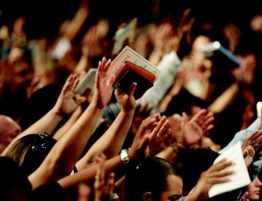
If you attend a Pentecostal / charismatic church, you may have witnessed or experienced a church service where the Holy Spirit “comes down” and “takes over,” and there is only praise and worship, no preaching. In such special services, there is an extended praise and worship together with an altar call. People get excited, run around the place, fall down, but there is no preaching because the Holy Spirit has “taken over.” People often remember this service fondly for years afterwards, “Remember the time the Holy Spirit took over the service and pastor could not even preach?” They often yearn and pray for such church experiences in the future.
Is that a scriptural expectation? Is that how our church services are supposed to be? This article answers that question, as well as the bigger question, is there a Biblical format for church services?
Main Points
- The Holy Spirit exercises control, but we never lose control.
- Preaching is an important instrument in God’s work. Services without preaching are not ideal.
- The early church services included preaching / teaching, fellowship, prayer. Any service without these things is not of God.
DOWNLOAD FREE CHAPTERS FROM OUR NEW BOOKS
Don’t misunderstand the nature of the Spirit’s work
There are so many problems with this particular church experience that I described above. Firstly, the Holy Spirit does not have to come down, He is already here. He was poured out 2000 years ago, and He never went back.
Secondly, it is not accurate to say the Holy Spirit took over a service because the preacher could not preach. This creates the impression that when someone preaches, the Holy Spirit is not in control. Yes, the preacher is in control in the sense that he chooses what to preach and how to deliver the sermon. But the only way those words can minister to you is if the Holy Spirit works through him. The Spirit’s control cannot be limited to times when we lose control. Christianity is a life where we co-operate with the Holy Spirit in various ways. He leads, we follow. He inspired the Bible writers, they wrote. We study the word, He brings it back to our remembrance. The Spirit is supposed to always be in control in that sense. It does not mean that we lose control.
Don’t underestimate the importance of preaching
Thirdly, we should not under-appreciate the importance of preaching the word. Preaching and teaching are fundamental aspects of Christianity. The foolishness of preaching is God’s instrument of choice (1 Corinthians 1:21). When we think of preaching as the pastor’s thing rather than the Spirit’s thing, we ironically downplay a major component of the Spirit’s work.
Fourthly, there is no scriptural basis for church services where there is only ecstatic worship and an altar call, but no preaching. People who esteem those no-preaching services, often allude to 2 Chronicles 5:14:
the priests could not stand to minister by reason of the cloud: for the glory of the Lord had filled the house of God.
This scripture is talking about the dedication of the temple, when God’s glory had so filled the place that the priests could not stand to minister. But what these people don’t realize is that even though the priests could not stand to minister, Solomon stood and addressed the people for 42 verses in chapter 6. So this scripture does not in anyway suggest that services without preaching are spiritually superior to services where the Spirit “takes over.” Here the Spirit took over and Solomon preached. Those two things are not mutually exclusive.
Is there is a Biblical format for church services?
Different denominations have entirely different styles of worship services. Some churches have hymns mixed in with congregational reading, followed by a short sermon. Some have long song services, long sermons and an altar call. What does the Bible teach about this?
There are two scriptures we can use to establish a Biblical church format – Acts 2:42 and 1 Corinthians 14:26.
The early church
Acts 2:42 And they continued steadfastly in the apostles’ doctrine and fellowship, in the breaking of bread, and in prayers.
In this verse, we see three things that were prominent in the very early church services.
- Doctrine (teaching)
- fellowship / breaking of bread
- prayer.
Note that singing and praise were not listed here. One possible reason for this is that since Christianity was so new, there were probably no songs written as yet. Most of the songs they knew would have been Jewish songs that were about the law and not about Christ. Later on, Christian songs were written, because when Paul and Silas were in jail in Acts 16:25, they sang hymns.
The point I am making is that praise and worship is not the big deal people think it is. Singing unto the Lord is great, but is is not a crucial part of a church service. And certainly, services where you only have singing and altar calls are not quintessential of the Christian church experience.
Essential components of church services are the preaching / teaching, prayer and fellowship. I reiterate that the song service is great, but not the most important part.
The charismatic context
1 Corinthians 14:26 How is it then, brethren? Whenever you come together, each of you has a psalm, has a teaching, has a tongue, has a revelation, has an interpretation. Let all things be done for edification.
This scripture discusses components of a church service from a charismatic point of view. In this verse, part of the service is devoted to individuals in the congregation using their spiritual gifts. It allows for people who have a song, a word, a tongue / interpretation. All of those things could be incorporated in a worship service, but they should be done in an orderly fashion. The emphasis should be on edifying one another.
This chapter paints a picture of order and decency (1 Corinthians 14:40). Even though it talks about gifts of the Holy Spirit, where clearly the Holy Spirit is supposed to be in control, we never lose control. Check out the highlighted portions of the verses below, which shows that even in a charismatic worship service, we never lose control.
1 Corinthians 14:27 If anyone speaks in a tongue, let there be two or at the most three, each in turn, and let one interpret. 28 But if there is no interpreter, let him keep silent in church, and let him speak to himself and to God. 29 Let two or three prophets speak, and let the others judge. 30 But if anything is revealed to another who sits by, let the first keep silent. 31 For you can all prophesy one by one, that all may learn and all may be encouraged. 32 And the spirits of the prophets are subject to the prophets. 33 For God is not the author of confusion but of peace, as in all the churches of the saints.
Conclusion
We need to have a Biblical understanding of what should and should not happen in a church service. The Holy Spirit should always be in control, but we should never lose control. Without this understanding, the door is open to those who allow ignorance combined with esoteric emotionalism to get carried away and lead the church down the wrong path. These people think the Holy Spirit is in control, when ironically it is they who have wrested control from the Spirit.
The next time you find yourself in a service where the “Spirit” has “taken over” the worship, ask yourself this question: what would happen if the musicians stopped playing? Do you think the “Spirit” would continue to “move”? I think we all know the answer to that question, and that should settle it. Let us continue to allow God to control every aspect of our lives in the way that He prescribed, and never our emotions and ignorance.







